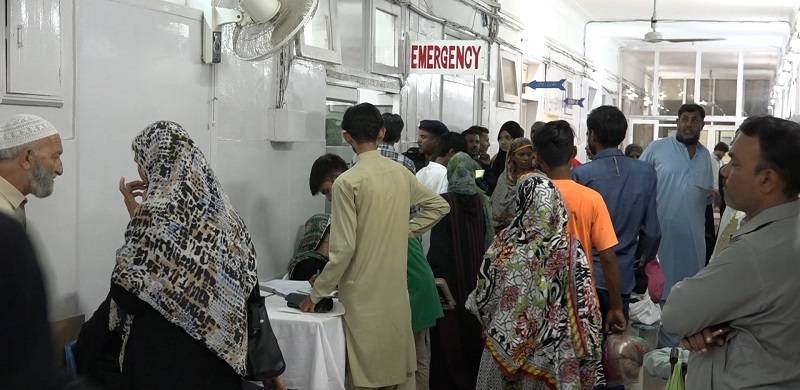
Imagine a ship caught in a storm — its sails are tattered as waves crash relentlessly against its hull. This is the state of Pakistan's healthcare system, which is steering a sea of crises, only to find itself sinking under the weight of long-term neglect, inadequate resources, and systemic inefficiencies. For a country of over 240 million people, the condition of its healthcare reflects a disturbing tale of mismanagement, where millions are left without access to necessary medical services, and Sustainable Development Goals (SDGs) remain an outlying dream.
According to the World Bank, Pakistan spends merely 2.9% of its GDP on healthcare, one of the lowest expenditures on health in South Asia. This distinct underinvestment has resulted in glaring disparities, including a lack of well-equipped hospitals, deficient healthcare workers, and a scarcity of basic medicines. Almost 70% of Pakistan's population lives in underserved rural areas, where healthcare services are hindered by the lack of medical personnel, sparse facilities, and the high cost of treatments. According to UNDP, (The three Ps of inequality: Power, People and Policy) access to basic health services is similarly limited and highly unequal. Low-income families have little or no access to the health care they need; if they face a serious illness, they are often compelled to take out loans to pay for health care. Ill health can cause heads of households to lose their jobs or suffer a permanent loss of income, with catastrophic consequences for themselves and their dependents.
Despite being a signatory to the United Nation's Sustainable Developmental Goals, particularly SDG-3, which emphasises good health and well-being, unfortunately, we remain woefully behind in achieving its targets. The challenges confronting Pakistan's healthcare system are countless and deeply embedded. With just one doctor for every 1,000 people and fewer than one hospital bed per 1,600 individuals, as noted by the World Bank, the system is stretched beyond its capacity. The situation is compounded by a lack of financial accessibility; over 70% of healthcare expenses in Pakistan are out-of-pocket, according to World Bank Data Indicators (WDI). This burden leaves millions of citizens unable to afford quality health care and pushes countless households into poverty each year.
Behind the dingy numbers lie tragic stories of lives ruined and cut short due to the unavailability of affordable and quality healthcare. An unhealthy population with numerous condensed capabilities cannot considerably contribute to the economy. Health indicators suggest that it is the lack of accessible healthcare. And although healthcare is certainly linked to problems of corruption and security, there is no reason why healthcare should not be made an immediate priority rather than placed on the back burner of policy discourse.
Furthermore, the governance of the healthcare system is equally troubling. Corruption, mismanagement, and a lack of accountability have impeded progress for decades. Funds allocated to healthcare are often exploited, and projects fail to deliver due to bureaucratic inefficiency. Moreover, preventive healthcare is largely ignored, as evidenced by the WHO and the US Centers for Disease Control and Prevention (CDC) 's report showing that only 66% of children in Pakistan receive essential vaccinations. This neglect leaves the population vulnerable to outbreaks of preventable diseases such as measles, polio, and hepatitis while emerging threats like dengue fever further strain an already crumbling system.
The reality is that poverty will not be eradicated by 2030, and the state may not be able to feed around 215 million children or ensure healthy living for all, but what can be achieved is chiselling programmes to the demographics of different regions by keeping in view the contextual formulas for efficient delivery
Mexico and Thailand are two developing countries that have made political dedications towards universal healthcare with very promising results. In 2002, the government of Thailand introduced a "30-Baht universal coverage scheme" that covered the entire population, guaranteeing that the concerned patient would not have to pay more than 30 Baht per visit for medical care. In addition to this, Thailand's 'Health Assembly' entitles citizens to actively participate in shaping their healthcare system. Similarly, Mexico's 'System of Social Protection in Health' has made substantial strides in improving access to healthcare for millions of Mexicans, demonstrating the positive impact of well-designed health policies.
Pakistan must undertake comprehensive and sustained reforms to achieve SDG-3 and provide equitable healthcare for its citizens. The government must seriously increase healthcare expenditure to at least 5% of GDP, as recommended by the WHO, focusing on building modern infrastructure and expanding services to underserved rural areas. Universal Health Coverage initiatives like the Sehat Sahulat Programme need to be strengthened and expanded to ensure that all citizens have access to affordable healthcare. Moreover, addressing workforce shortages is critical; this can be achieved by incentivising rural postings for doctors and nurses and by collaborating with institutions like Aga Khan University to train healthcare professionals.
Sustainable development is indeed achievable if devolution is involved. If implemented effectively, the SDGs will serve the citizens by bringing accountability and decision-making within provincial jurisdiction. The reality is that poverty will not be eradicated by 2030, and the state may not be able to feed around 215 million children or ensure healthy living for all, but what can be achieved is chiselling programmes to the demographics of different regions by keeping in view the contextual formulas for efficient delivery.
Although the storm is fierce, there is hope that Pakistan's healthcare system can steer toward calmer waters. Strategic reforms, political will, and a commitment to prioritising health as a fundamental right can realign the system with its people's needs and the SDGs' aspirations. The journey will undoubtedly be arduous, but the lives at stake demand urgent action. As Amartya Sen and Jean Dreze rightly urge in their book, An Uncertain Glory: India and Its Contradictions, that issues of healthcare should be brought closer to democratic politics.

